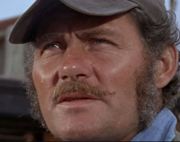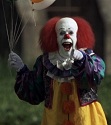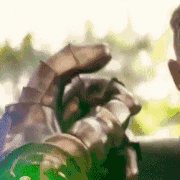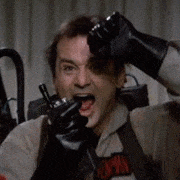|
NikkolasKing posted:But anyway I just got passed the part where Adult Bev and Bill gently caress in the hotel while poor Mike is dying. I would lay into Bill for cheating - which is something I personally detest as much a "worse" crimes - but I guess he has the excuse of God making him do all this. You haven't really read the thread have you?
|
|
|
|

|
| # ? May 31, 2024 12:15 |
|
It's almost 200 pages and undoubtedly full of spoilers so no I have not.
|
|
|
|
NikkolasKing posted:It's almost 200 pages and undoubtedly full of spoilers so no I have not. This thread is really good about actually spoilering spoilers, there's still many of King's works I have to read and not one of them has been spoiled for me so far.
|
|
|
|
NikkolasKing posted:I'm wondering why King isn't laid into for SEXISM SEXISM MISOGYNY as GRRM is. Or any writer really who dares has a female defined by her sexuality because clearly this means the writer hates women. King's been laid into for it before. (Hell, take a look at some of the earlier replies in the thread, where a couple of posters were 'literally shaking' because of all the rape, not to mention the cyclic chat about the gangbang). He's also been banned in schools, shat on by academics, and blamed for acts of violence (he mentions a couple in Danse Macabre). Point is, he's taken his lumps, but he's endured long enough to become a cornerstone of horror and modern fiction. But more than that, his audience tends to skew older, and older readers, as a rule, don't rush to the internet to blog their outrage for some weird form of validation. With Martin, I think things are the opposite. Before he became popular--that is, before the show--there wasn't a lot of online criticism of his work simply because not a lot of people were talking about it. Now it's one of the most watched (and most pirated) shows in history, and it's airing at a time when anyone with a computer and an internet connection has a voice. So you get hashtags about sexism and facebook posts about misogyny and dailybeast articles about Dany's stockholm syndrome and AVClub articles about Jaime and Cersei going at it in the sept. It's a volatile topic that's easy to weigh in on because it's emotionally loaded.
|
|
|
|
Taeke posted:This thread is really good about actually spoilering spoilers, there's still many of King's works I have to read and not one of them has been spoiled for me so far. Hm, I'll give it a browse then. Kinda doubt I'll read the whole thing or even half of it but I do enjoy lurking and reading others' views on fiction I'm new to. 3Romeo posted:King's been laid into for it before. (Hell, take a look at some of the earlier replies in the thread, where a couple of posters were 'literally shaking' because of all the rape, not to mention the cyclic chat about the gangbang). He's also been banned in schools, shat on by academics, and blamed for acts of violence (he mentions a couple in Danse Macabre). Point is, he's taken his lumps, but he's endured long enough to become a cornerstone of horror and modern fiction. That all does make a lot of sense. I just know Stephen King as...well, as a cornerstone of modern fiction like you said. I never imagined he might be hated for being "controversial" or whatever. It's just not something I expected when starting on my King kick. The Shining was pretty straightforward although The Stand had some very bizarre elements. I guess I'll just have to wait and see how deep the rabbit hole goes.
|
|
|
|
My last answer was a little knee-jerk, and I got to thinking a little more about it. Sex in literature, like sex in most any other form of media, is one of those things that--generally speaking--American society is both repulsed by and attracted to. That isn't exactly a new idea, I know, but it's different when it comes to books because, for whatever reason, books are seen as a higher-quality form of entertainment. You'll see people making resolutions to read more, but you won't, for instance, ever hear someone unironically say that they resolve to spend ten hours a week watching Cheers reruns. And because books are usually the effort of a single person, it isn't hard to make an assumption that the writer is some kind of solitary weirdo when you start reading a particularly awkward scene in a media that you expected to have at least some kind of quality standard. The bad Song of Ice and Fire thread's been doing that for ten years. And sex in literature, like sex in other forms of media, is something that can serve a narrative (or psychological) purpose. As weird as the gangbang is in It, it's also the final proof that what the Losers are doing is beyond their control, and that what they're a part of is something that goes beyond social mores. In other King stories, he conflates the image of sexual abuse and the image of his monster. I can't think of a sexual scene in anything King's written that's just there for titillation, and even the more explicit scenes aren't that explicit compared to anything in, say, Fifty Shades. Martin uses some questionable (and laughable) metaphors (eg, fat pink mast, Myrish swamp), but his biggest flaw in that regard is that he uses it as a way to set the stage for the world. Dany getting raped at 13 is pretty harsh, sure. But the more important--that is, the more character-focused--aspect completely goes ignored: she falls in love with the guy that raped her and never once questions it. That's an interesting psychological conflict that, with good writing, can be compelling enough to explore, but Martin drops the ball in favor of one-boob dresses and prophecies in Qarth. (Incidentally, the show didn't do her character any favors, and it's vaguely disturbing that the shallow girl-power veneer of her story makes her so popular.) But sex in literature, like sex in any other media, can be done absolutely loving terribly. When it adds to the story, or when it exposes part of a character (there's a reason that sexual thoughts in literature are usually pretty weird; the characters are naked in more ways than one) it works. But when it doesn't--when it's just mechanical description that's made worse by absurd poetics--what's the point? edit for clarity Asbury fucked around with this message at 01:58 on Feb 9, 2015 |
|
|
|
I am on the verge of finishing my re-read of IT (first time in 25+ years), and I really enjoyed it more than I remember. Still I think prefer Dan Simmons' Summer Of Night (which is his rip off of IT) over IT.
|
|
|
|
Like 3Romeo said, GRRM doesn't get poo poo for misogyny for any of these reasons:NikkolasKing posted:a female defined by her sexuality because clearly this means the writer hates women. Me, I'm no prude and I think the hysteria around sex in fiction is laughable. King having Bev gently caress the entire population of Derry wouldn't mean King supports little girl sex any more than him having all these people killed means he supports murder. But readers have a peculiar obsession with sex and how sex must "tell you something about the writer" while violence apparently says nothing and is just fine and dandy. He gets poo poo for misogyny because he wrote about sex and handled it really badly. People get hung up on this idea that writers are criticized just for writing about sex. A lot of writers get poo poo because they are not good at writing about sex, or because they use their writing to explore their own fetishes (like Piers Anthony).
|
|
|
|
nate fisher posted:I am on the verge of finishing my re-read of IT (first time in 25+ years), and I really enjoyed it more than I remember. Still I think prefer Dan Simmons' Summer Of Night (which is his rip off of IT) over IT. Maybe my brain isn't wired properly but I couldn't get through more than a third of Summer of Night. I kept glazing over while reading it. Does it pick up the pace at all?
|
|
|
|
General Battuta posted:Like 3Romeo said, GRRM doesn't get poo poo for misogyny for any of these reasons: My problem is when people assume anything about a person based on such a flawed basis. It be like me trying to say I can make a valid and real judgment about you based just on your SA posts. Maybe a writer writes about sex because sex sells and all the sex in their literature is nothing more than "I want to sell more books and get more money!" It's not just about sex for me, I see this kind of rash, judgmental BS with other writers. I can't count the number of times I've read "Michael Crichton is a Luddite!" or "Michael Crichton hates technology." To me, it's not a question of their writing ability or lack thereof. You can hate King or Crichton or Martin or whoever you like, it's people thinking they know more than they do that makes me angry.. FYI, Michael Crichton didn't live on a farm with 18th Century agricultural equipment or freak out every time his picture was taken. He in fact wrote an entire book about his airplanes are an amazing invention and the safest form of travel and how the "dangers of this technology" have been overstated by a sensationalist media. I guess I jumped the gun so sorry. I just didn't feel like finding another author I like who gets a bunch of know-nothing know-it-alls who think they have some great insight into a writer's psyche because they read a dumb piece of fiction.
|
|
|
|
I recently re-read IT, since I'd last read it when I was 15 and I didn't remember it all that well(I'm 31 now), and I was pretty surprised at just how short and relatively meaningless the scene was; from the way it's talked about you'd think IT was nothing but 800 pages on how awesome pre-teen gangbangs are. Really, the majority of the IT gangbang posts I've read in this thread feel like they just included because they're afraid that people will think they're pedophiles if they don't go out of their way to say that it's awful.
|
|
|
NikkolasKing posted:So I'm rapidly closing in on the ending and it kinda sucks I already know more or less about the Turtle. Been foreshadowed all book but I read years ago, in an article highlighting the novel's strengths and why the TV series sucked, about how it's some big cosmic entity just like It. Even read some King nerds who speculate what "It" and the Turtle are relates to his Dark Tower cosmology. Mostly because King is writing horror (well, supposedly). Most of his characters regardless of gender or any other personal characteristics are damaged and violated in horrible ways at some point. The sex-related trauma is just another tool in the toolbox used for making you recoil. It is very different from the inevitably weird semi-erotica that infests fantasy novels.
|
|
|
|
|
NikkolasKing posted:
Nothing to apologize for, dude. You're making a good point, in that the author and the work are two separate things. Which, thank Christ, they are. A fair number of revered writers were pretty terrible people. T.S. Eliot and Ezra Pound, for instance, really had this thing about Jews. The thing is, with any popular writer, there's always going to be a weird celebrity to them. They have money and they have success (often along with with a rags-to-riches story), which anyone wants, and those two things are predicated on a skill that seemingly anyone can acquire. They aren't treated like royalty, the way actors and actresses are; they're treated like that weird uncle who got lucky with the lottery. And because their work is generally theirs alone, it's easy to half-rear end simple claims about their psyche or their personality, even with (or sometimes especially with) something like fiction. Point being: you have the right approach, treating the work as something separate from the person who wrote it. While some stories implicitly (or explicitly) do show questionable aspects of the writer's personality, most of them never make it past an editor's desk. They end up self-published on the Kindle store.
|
|
|
|
Wife and I are listening to The Shining on commutes and before bed. By chapter 10 or so, I was getting a lot of hugs and adoration for just not being an abusive husband/father in my daily life. King captures the building of attraction and young love, and then the dissolution of affection and trust so well that I look great by comparison. He sets up the rising fortunes of Jack and Wendy and Danny as a hopeful family with a future and love, and then chips away at them as Jack succumbs to his drink and demons. It's so well realized and just rings true in every word. Re-listening to it, it feels partly autobiographical - and I have to imagine that it's the biggest reason that he still hate hate HATES Kubrick's movie when he's had so many crap adaptations of his work. It's not just King's vision that was compromised, but also on some level, Kubrick making Jack a latent, inevitable madman removes King's real-life redemption as surely as it removes Jack's. Just my impression, and it may be nothing more than me falling under the spell of his best writing, but it feels very personal to the author.
|
|
|
|
I'm pretty sure King has said it was his most personal book.
|
|
|
|
WattsvilleBlues posted:Maybe my brain isn't wired properly but I couldn't get through more than a third of Summer of Night. I kept glazing over while reading it. Does it pick up the pace at all? I never had a problem with pacing while reading Summer of Night, but if you are not enjoying it that far in good chance it is not for you (it grabbed me from start). It just works that way sometimes. I think Summer of Night benefited by focusing just on the main characters as kids. I actually cared for the characters in Summer of Night more, and I found it to be a stronger 'coming of age' story than IT. That said I still think IT is the better book quality wise. When I make the statement that I prefer Summer of Night over IT, I am making that judgement by which book I enjoyed (entertained me) more. I am planning to read Summer of Night again this year (for the 4th time I think), but I doubt if I will ever read IT again.
|
|
|
3Romeo posted:Nothing to apologize for, dude. You're making a good point, in that the author and the work are two separate things. Which, thank Christ, they are. A fair number of revered writers were pretty terrible people. T.S. Eliot and Ezra Pound, for instance, really had this thing about Jews. I don't know if I'd go that far. Looking at, say, Summer of Night compared to IT and you can see many of the major differences reflected in differences between the ways Dan Simmons and Stephen King view the world, but I dunno if you could divine that without prior knowledge about them, which is still the key point.
|
|
|
|
|
NikkolasKing posted:It's almost 200 pages and undoubtedly full of spoilers so no I have not. Sorry. I just meant the "it" in It comes up quite a lot and always leads to a 2 page discussion about precisely the issue you brought up. I wasn't trying to be a dick.
|
|
|
|
Effectronica posted:I don't know if I'd go that far. Looking at, say, Summer of Night compared to IT and you can see many of the major differences reflected in differences between the ways Dan Simmons and Stephen King view the world, but I dunno if you could divine that without prior knowledge about them, which is still the key point. I've never read Summer of Night, but from what I gleaned in the thread, it's similar to It, right? If that's the case, I'll have to give it a shot. It's always interesting to see two different takes on a similar premise. But I think we're agreeing, here. A story can (and often does) offer a peek at the writer's view of the world, but with good fiction, there should always be separation between the two. King, for instance, seems like a nice enough guy--kinda nerdy, liberal, generally decent. I don't think he's actually down with IRL teen gangbangs or gunbarrel sodomy. I mean, he might be. But I doubt it. Something like that, it'd probably get out. But that isn't to say that some writers put too much of themselves into their fiction. The Fountainhead is a flawed justification of a lovely ideal, and Dominique Francon is the author's insert. Yunior is Junot Diaz. Crichton gave a name of one of his critics to a pedophile with a small dick. In each of those instances, the writer gets in the way of the story, and when that happens, the story suffers. Good fiction maintains that separation. Asbury fucked around with this message at 18:59 on Feb 9, 2015 |
|
|
3Romeo posted:I've never read Summer of Night, but from what I gleaned in the thread, it's similar to It, right? If that's the case, I'll have to give it a shot. It's always interesting to see two different takes on a similar premise. Right. Ramsey Campbell, one of the greats of British horror, regularly jokes about how his next book will be titled Spanked by Nuns because he keeps inserting his childhood in strict Catholic schools accidentally or implicitly, to say nothing of when he does it deliberately.
|
|
|
|
|
3Romeo posted:Crichton gave a name of one of his critics to a pedophile with a small dick. I have to admit though, that's pretty goddamn funny. Talk about a giant middle finger.
|
|
|
|
3Romeo posted:I've never read Summer of Night, but from what I gleaned in the thread, it's similar to It, right? If that's the case, I'll have to give it a shot. It's always interesting to see two different takes on a similar premise. Summer of Night is a coming of age story set in 1960, and this group of kids are forced to face an ancient evil in their town. So it is like IT minus them as adults, 400 pages, King's ending, and the overall quality of King's writing during IT. I did read some reviews that the story takes too long to develop (like WattsvilleBlues said), but I enjoyed the build. The book also reminds me of The Body (Stand By Me) too. Of course almost any coming of age story set in that time would. Speaking of books that capture being a kid, has anyone read Robert McCammon's Boys Life? I've only read his Swan Song (while not great it is an interesting read for fans of The Stand), but I have thought about reading Boy's Life for years.
|
|
|
|
nate fisher posted:Summer of Night is a coming of age story set in 1960, and this group of kids are forced to face an ancient evil in their town. So it is like IT minus them as adults, 400 pages, King's ending, and the overall quality of King's writing during IT. I did read some reviews that the story takes too long to develop (like WattsvilleBlues said), but I enjoyed the build. The book also reminds me of The Body (Stand By Me) too. Of course almost any coming of age story set in that time would. Last year I read December Park by Ronald Melfi and it reminded me a lot of the Stephen King coming of age stories. It's pretty recent and pretty good.
|
|
|
|
oldpainless posted:I'm pretty sure King has said it was his most personal book. I'd thought I'd read that somewhere, but I was typing on my phone in bed and didn't feel like Googling. I'm going to stress that, since we're talking about author insertion on this page, that I'm not condemning King for his past faults as admitted or "autobiographied" into his books, to the extent that they were. It's pretty clear from his past interviews that he knows his drug and alcohol use wasn't good for him or his family, and he takes responsibility. At the same time, using that very-real angst and conflict to paint the vivid picture of the fracturing Torrance family, made for some spectacular characterization and the dynamic between the three of them is his best, most realistic work, IMHO. That's why the book is so good - not because a spooky hotel is the best hook for human fear ever imagined, but because the spare, well-realized cast, and their strained relationship feels as real to me as people I know.
|
|
|
|
BiggerBoat posted:Sorry. I just meant the "it" in It comes up quite a lot and always leads to a 2 page discussion about precisely the issue you brought up. I wasn't trying to be a dick. Nah it's cool. I should read more of the thread. 3Romeo posted:But that isn't to say that some writers put too much of themselves into their fiction. The Fountainhead is a flawed justification of a lovely ideal, and Dominique Francon is the author's insert. Yunior is Junot Diaz. Crichton gave a name of one of his critics to a pedophile with a small dick. In each of those instances, the writer gets in the way of the story, and when that happens, the story suffers. Good fiction maintains that separation. Of course that last line gets into the realm of the Author Filibuster, a dubious technique that I'm not sure people like for the most part. To bring things back to Crichton, he sure loved those ad I liked reading them because a lot of them were interesting. Like Malcolm's tale of how ancient and enduring the Earth is and humans are beyond idiotic every time they say they can destroy it. And someone who could give even Crichton lessons on the subject is another writer I like a lot, Victor Hugo. I love Les Mis I loved the way he described the various characters' plights; their vices and their virtues. But in between all that he'd write entire chapters on what he thought of various political leaders, religion, and god knows what else. And while people will undoubtedly challenge Crichton's fame and success, Hugo wrote a couple beloved classics. This is why, even though I'm a layman, I don't even believe in "literary criticism." Because gently caress if anyone can decide what is good or not, what you can do and what you can't do. Apparently the best writers can break all the loving rules. But who are "the best writers?" Nobody loving knows that either. On a related note, do any of you who know more about King's life than I do know if his account of Bill in college is from personal experience? You know, how his college prof was a pretentious rear end who insisted every piece of writing had to be DEEP and writing wasn't just something you do for fun?
|
|
|
|
savinhill posted:Last year I read December Park by Ronald Melfi and it reminded me a lot of the Stephen King coming of age stories. It's pretty recent and pretty good. I always wanted to get into his stuff (heard about The Floating Staircase and Snow), and your post has convinced me to finally order one of his books.
|
|
|
|
Aquarium Gravel posted:I'd thought I'd read that somewhere, but I was typing on my phone in bed and didn't feel like Googling. Yeah. Jack Torrance is one of the best characters King ever wrote. What makes King such a great writer--when he's on point, I mean--is that he's able to keep (and present) the emotional truth inside the fiction. Jack, Jim Gardner, Larry Underwood, and Eddie Dean are all aspects of King's best archetype: flawed and selfish people who, depending on their environment, have a strong potential to redeem themselves. (I think Jack might've made it okay if he'd never gone to the Overlook--the chapter where he's shingling the roof and thinking about George Hatfield, where he accepts and admits what he is, it's a really loving elegant piece of self-realization.) NikkolasKing posted:On a related note, do any of you who know more about King's life than I do know if his account of Bill in college is from personal experience? You know, how his college prof was a pretentious rear end who insisted every piece of writing had to be DEEP and writing wasn't just something you do for fun? It's worth noting, though, that in On Writing, King does mention that he doesn't have a problem with allegory or symbolism or any of the "deeper" aspects of writing. But he makes a pretty good point when he says that they should be icing, and not the cake.
|
|
|
|
NikkolasKing posted:This is why, even though I'm a layman, I don't even believe in "literary criticism." Because gently caress if anyone can decide what is good or not, what you can do and what you can't do. Apparently the best writers can break all the loving rules. But who are "the best writers?" Nobody loving knows that either. Literary criticism is thinking and talking about literature like it's something important that rewards thought and conversation. It's not science where you rule out hypotheses and make predictions and narrow down to a solution. It's just a huge conversation. I can't speak for any other writer but that's what I want most, readers who think and care and discover things that maybe I didn't even think of.
|
|
|
|
Just wanted to say I finished Mr. Mercedes a few minutes ago and I loved it. I plowed through the last third in one sitting because I couldn't slow down. It wasn't perfect or anything, but wow it was a fun read.
|
|
|
|
NikkolasKing posted:This is why, even though I'm a layman, I don't even believe in "literary criticism." Because gently caress if anyone can decide what is good or not, what you can do and what you can't do. Apparently the best writers can break all the loving rules. But who are "the best writers?" Nobody loving knows that either. I was leery of criticism for a long time for pretty much the reasons you mentioned. But there is some value to it, if you're interested in a different way to read. Literary criticism isn't just the 2-star review in USAToday or the overly dense thesis of some academic going neurotic over tenure. Done well, like Battuta said, it can let you see angles and connections of a story that you might not even think of. If you're down for it, think of works of fiction as additions to a conversation. Any good writer is going to be a good reader, and a good writer knows what they're adding to. Or what they're rewriting. A lot of writers will even reference other works in their stories to tell you what to look for. King does this all the time. Take Jim Gardener in The Tommyknockers. He's basically Hamlet--a guy in a pit of snakes who sees tragedy coming but can't avert it. King straight-up has Gard think that he's playing Hamlet, in fact. The story isn't the same but the character is similar. And King's telling you to look at the comparisons, if you want to. He isn't saying it's necessary--the novel isn't an allegory for the play--but it does add a nice layer to the text. If you know how Hamlet ends, you have an idea of how Gard's gonna go out. That same inter-textual comparison works with plot, setting, style, theme (especially theme)--anything, in short, that a reader can respond to. And what they write is their response to the text. The thing that Pennywise is? It's pure Lovecraft. Friends banding together to take out a monster? That's as old as our oldest stories. It's King Arthur. (Which, incidentally, Bill even thinks about.) These are things that King knew and incorporated into his own story while putting his own twists and turns onto the idea. And what comes out is one of his best works, and probably one of the best books of horror, in the twentieth century. Criticizing a book on what traditions it comes from and what it does as a part of a conversation about those traditions, that isn't a bad metric at all. edit: keep in mind that this doesn't just apply to books. Breaking Bad is a modern western. Even has showdowns and train robberies. The Wire, as much as David Simon mocked the term, is Dickens' structure moved to early 21st century America. House of Cards owes a lot of what it is to Richard III. Each of those shows wears their respective influences on their sleeves, and if know where they come from, you have an idea of what they're trying to say (and how they're saying it). But all that said: in my mind, what separates good work from bad is if the base story--the entertainment aspect, what you paid to read or see--works without those little subtleties. If there isn't any meat to the story, if all that's to it are abstract references and sly tricks, it's missing what's most important. Asbury fucked around with this message at 02:30 on Feb 10, 2015 |
|
|
|
I appreciate all the great responses guys. I enjoyed reading them a lot. It's certainly true that literary criticism doesn't have to be just about slamming books or their authors and I was probably too hasty in throwing that term around. I do love discussing fiction with people and that's the reason I'm here really. I want to share my growing love and appreciation for King's work with you all. But I just finished IT. I think my favorite characters, apart from IT itself, were Richie and Beverly. I wish we had seen more from the Turtle. The part in 1985 where Bill confronts IT in the guise of Georgie was both scary and heartbreaking. If anybody has ever heard the audiobook, it's loving fantastic. Maybe the guy who reads is no Tim Curry but I still loved him. GONNA KILL YOU ALLLLLLLLLL!!!! Overall a really good book and I think the second half was better than the first. I was contemplating very hard what I wanted to read next. I found this article which intrigued me. See, I know the DT series later on had a very...unsavory reputation (the first ten pages of this thread is mostly complaining about it) but I am curious about "the King Canon" or the King Universe as the article says. I loved how IT took something so fantastically powerful and brought it down into a smaller conflict. It reminded me of The Stand in that way. I never did finish that but I liked what I did read. But anyway I was reading that article to see if there's anything else like that in King's bibliography because I mentioned earlier I had read others speculating on what exactly IT was and how it might be explained in other King works that expanded his cosmology. One thing I kept hearing a lot about was "the Purpose and the Random" A guy told me the Purpose was the Turtle and IT was the Random. Looking at that article, that idea stems from Insomnia. Would you guys recommend that or not? The other one I was considering was Eyes of the Dragon. I hear it's King's most strict fantasy novel and I'd be interested in seeing that. Especially since I hear it has Flagg in it and he was one of the best parts of The Stand. Although, he might be characterized completely differently here.
|
|
|
|
NikkolasKing posted:But I just finished IT. I think my favorite characters, apart from IT itself, were Richie and Beverly. They have a cameo in 11/22/63. quote:If anybody has ever heard the audiobook, it's loving fantastic. Maybe the guy who reads is no Tim Curry but I still loved him. GONNA KILL YOU ALLLLLLLLLL!!!! I listened to the Steven Weber* read version last summer and it was fantastic. Really engrossing and the first time I've "read" it since I was the age of the kids in the Loser's Club. quote:The other one I was considering was Eyes of the Dragon. I hear it's King's most strict fantasy novel and I'd be interested in seeing that. Especially since I hear it has Flagg in it and he was one of the best parts of The Stand. Although, he might be characterized completely differently here. Some people would call Eyes of the Dragon kid-lit but I really enjoyed it and have read it several times since it's a shorty compared to his ponderous later works. *Weber has done a lot of King stuff from the regrettable The Shining miniseries to the more recent adaptations of Desperation and Nightmares and Dreamscapes (You Know They've Got a Hell of a Band.)
|
|
|
|
Yeah the version of IT I listened to was read by Weber as well. I had no idea he was in so much King stuff. I wonder if that's why he was hired to read the book. Whatever the reason, I wish he read more of them.
|
|
|
|
So I tried to read the DT series as a sophomore in high school, and quit a third of the way into wizard and glass because I found the 600 page flashback boring as poo poo. I'm now halfway through wizard and glass on my second attempt at a read through of every book, at age 24 I find it really interesting and well written, and the setting of this fourth book is not my cup of tea at all, though, I'm still so captivated by the way King writes it and look forward to reading it every day. Maybe maturity plays a role in this.
|
|
|
|
NikkolasKing posted:Yeah the version of IT I listened to was read by Weber as well. I had no idea he was in so much King stuff. I wonder if that's why he was hired to read the book. Whatever the reason, I wish he read more of them. He gives a great reading of IT. And I think he does an admirable job of trying to take it out of Tim Curry's shadow, but he really performs the book so well instead of just reading it out loud. On another note, I'm currently listening to John Glover reading Night Shift and he does a really good job with it as well.
|
|
|
|
nate fisher posted:Speaking of books that capture being a kid, has anyone read Robert McCammon's Boys Life? I've only read his Swan Song (while not great it is an interesting read for fans of The Stand), but I have thought about reading Boy's Life for years. Yeah, I've read Boy's Life several times as a pre-teen and teen. Its probably one of my favorite books, and is my mother's third favorite book after To Kill a Mockingbird and Prayer for Owen Meany.
|
|
|
|
So there's something I want to comment on and then ask you all about. Having finished IT, I see some similarities between IT and Randal Flagg. Namely in the department of "they can be nice, they can be alluring, but you still know they're evil." They both represented Evil at its most basic, fundamental level. They were creatures and personifications of it. But the problem is, while this is fine and dandy for IT, Flagg bothered me. He was supposed to be a leader, someone a lot of people would flock to. And not just the evil or insane or te vindictive, but normal people too. Not everyone in his camp was actually supposed to be bad as far as I can recall. A lot of them were normal people. But why would any normal person choose to go to Flagg? The thing about Flagg is that, just like IT, people felt their evil when talking to them. No matter how much old Randy smiled and promised you the moon, anyone who ever talked to him comments on how he gives them a chill or something to that effect. No matter what he does he radiates malevolence and negativity. And so my question again why would anyone side with him apart from the most depraved? Yes I understand people were scared and desperate but this isn't a case of being fooled. I don't care how scared and desperate you are, if a guy fills you with mortal terror when you so much as dream about him, why would you go to him? I think evil should be more...subtle.
|
|
|
|
NikkolasKing posted:So there's something I want to comment on and then ask you all about. You do what you have to, to survive. They feared him, but were shown that if you follow his rules, you survived and lived a safe life in an ordered society. No crime, no drugs. It was authoritarian as hell, but it was "safe". When the world collapses around you, safety is a huge carrot to that stick.
|
|
|
|
NikkolasKing posted:But why would any normal person choose to go to Flagg? They had lights. They had power. They had order. They didn't have this "Somebody went down the street shooting out windows, do we have any right to stop him? Can we throw somebody in jail? Would that be wrong?" stuff going on. I imagine all that poo poo would be incredibly reassuring in the aftermath of something like Captain Trips. I know I'd be tempted by it.
|
|
|
|

|
| # ? May 31, 2024 12:15 |
|
Khizan posted:They had lights. They had power. They had order. They didn't have this "Somebody went down the street shooting out windows, do we have any right to stop him? Can we throw somebody in jail? Would that be wrong?" stuff going on. I imagine all that poo poo would be incredibly reassuring in the aftermath of something like Captain Trips. I know I'd be tempted by it. And also you didn't have to get your rear end across the Rockies if you were on the West Coast, which was a pretty big thing for people dealing with destroyed travel and poo poo.
|
|
|





























